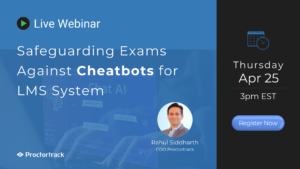As online exams become more prevalent, ensuring the security of these exams is of utmost importance. Cheating and fraud can not only compromise the integrity of the exam but can also undermine the credibility of the entire educational institution. With technological advancements, online exam security measures have also evolved, making it easier to prevent cheating and protect exam content. This blog will discuss some essential tips that can help you secure your online exams in 2023 and beyond.
Why Securing Online Examination is Important?

The security of online exams is crucial for several reasons:
Preventing Cheating: Online exams are often under monitoring remotely, making cheating easier for students. Without proper security measures, students can access unauthorized materials, communicate with other students, or use additional resources to cheat on the exam.
Ensuring Fairness: By preventing cheating, security measures help ensure that all students are evaluated based on their knowledge and skills rather than their ability to cheat or access unauthorized materials.
Protecting the Integrity of the Exam: Online exams are imperative to evaluate students’ knowledge and skills, and the results are helpful for grading, certification, or other purposes. The results can be invalid or unreliable if the exam is not free from cheating or other security breaches.
Maintaining the Institution’s Credibility: If an online exam is compromised, it can reflect poorly on the institution that administered it. This can damage the institution’s reputation and credibility. Also, may lead to a loss of trust from students, faculty, and other stakeholders.
Ensuring the security of online exams is essential to maintain fairness, protect the integrity of the exam, and maintain the credibility of the institution that administers the exam.
Hurdles of Conducting Online Examinations
There are several hurdles in conducting online examinations. Here are some of the most common ones:
Technical Issues: Online examinations require stable internet connectivity and a suitable computer or mobile device. Technical issues such as slow internet speeds, server downtime, and malfunction can disrupt the examination process.
Cheating: Online examinations are more susceptible to cheating than traditional exams. Test-takers can easily search for answers online or use unauthorized materials during exams.
Lack of Supervision: In an online examination, it is difficult to monitor test-takers behavior. This lack of supervision can lead to unethical conduct or cheating.
Security Concerns: Online examinations are vulnerable to hacking and other security breaches, which can compromise the confidentiality and integrity of the exam.
Accessibility: Online examinations may not be accessible to students who do not have access to computers, smartphones, or reliable internet connectivity. This can create inequalities and limit the participation of some students.
Technical Support: Students may encounter technical difficulties during the exam, and with proper technical support, they may be able to complete the exam on time.
Tips to Conduct Online Exams Securely and Seamlessly
Online exams can be a convenient and efficient way to test knowledge, but it requires careful planning and implementation to ensure a secure and seamless process. Here are some tips to help you conduct online exams securely and seamlessly:
Use a Secure Online Platform: Choose a secure platform for conducting online proctored exams. Some popular options include Google Classroom, Blackboard, and Canvas. These platforms have the design to provide a secure and seamless exam-taking experience.
Use Multi-factor Authentication: Implement multi-factor authentication to ensure only authorized users can access the exam. You can require users to enter a password and answer security questions, or you can use other authentication methods, such as biometrics.
Monitor the Exam: Have proctors or instructors monitor the exam to ensure students are not cheating. You can use webcam monitoring, screen sharing, and other tools to ensure that students are not accessing unauthorized resources during the exam.
Randomize Questions and Answer Choices: Randomizing questions and answer choices can help prevent cheating by making it more difficult for students to collaborate. Most online platforms provide this feature.
Set Time Limits: Set a time limit for the exam to ensure students complete it within a specific timeframe. This can help prevent students from spending too much time on a single question or accessing unauthorized resources.
Communicate Expectations Clearly: Communicate your expectations clearly to students before the exam. Provide detailed instructions on accessing the exam, what materials they can use, and what behavior is acceptable during the exam.
Test the Platform Beforehand: Test the platform before the exam to ensure it works properly. Ensure that students can access the exam and that all features function correctly.
By following these tips, you can conduct online exams securely and seamlessly and provide students with a fair and reliable way to demonstrate their knowledge.
How is Online Proctoring Critical to Secure Online Exams?

Online proctoring is an essential tool to ensure the integrity and security of online exams. With the increasing trend of online learning and remote testing, there is a need for measures to prevent cheating. It ensures that the test-takers performance solely depends on their knowledge and skills with digital proctoring.
Remote proctoring utilizes advanced technologies such as artificial intelligence, machine learning, and computer vision. It monitors the test-takers behavior during the exam. These online exam management systems allow proctors to observe the test-takers actions and detect suspicious activities that might indicate cheating, such as copying or consulting unauthorized materials.
Online proctoring also includes identity verification processes, such as facial recognition and ID verification, to ensure that the test-taker is who they claim to be. Online examination software helps prevent impersonation and ensures that the test-taker is the same person who enrolled in the course and registered for the exam.
Moreover, online and video proctoring allows proctors to monitor the test-taker’s internet activity. It also restricts access to unauthorized websites or applications. Online examination solution also records all the activities during the exam, including the test-taker screen and webcam. Also, online exam security software uses the microphone, which is useful for review later in case of any discrepancies or complaints by the remote proctor.
Overall, online proctoring is critical to secure online exams. It ensures the integrity of the exam, prevents cheating, and helps maintain fairness and equity in the evaluation process.
Conclusion
Online exams provide a convenient and accessible way for students to take tests remotely. However, the importance of maintaining the security and integrity of these exams remains the center of consideration. Implementing the tips mentioned in this blog can help secure online exams and prevent fraud. As technology evolves, staying up-to-date with the latest security measures and techniques to safeguard your online exams effectively is crucial. By doing so, you can protect the credibility of your educational institution. Additionally, it provides a fair and accurate assessment of your student’s knowledge and skills.







